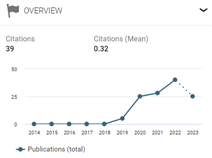Analisis kepatuhan penerapan protokol covid-19 pada masa adaptasi kebiasaan baru di masjid wilayah Pedurungan Semarang
DOI: 10.30867/gikes.v4i1.1089Abstract
Background: The implementation of the Covid-19 protocol is a form of the government effort to prevent and break the chain of transmission. The government seeks to optimize the implementation of the Covid-19 protocol, taking into account various joints and fields of community life such as socio-economics, culture, and religion. The Covid-19 protocol has been standardized in places of worship, one of which is the mosque for implementing congregational prayers. Its implementation and application received various responses from the mosque management and congregation. It can be influenced by various factors such as the level of knowledge, attitudes and behavior of the community.
Objectives: The study aims to specifically describe the implementation and compliance level of the Covid-19 protocol in several mosques in the Pedurungan Semarang area.
Methods: The design used in this observational study was cross-sectional and was conducted only with a descriptive approach. The study was conducted in several mosques in the Pedurungan Semarang area from April to June 2022. The sample was 150 people, taken by stratified random sampling from the congregation of each mosque. Data collection on knowledge, attitude and, behavior, compliance was carried out by direct interviews using a questionnaire and observation of the implementation of the Covid-19 protocol. Data processing was carried out by editing, coding, and tabulating. Data analysis was only carried out descriptively, and frequency distribution was.
Results: The implementation of the COVID-19 protocol in the three mosques in the Pedurungan Semarang area has been quite good (32,7%), good (16,7%), and very good (36,0%), and when the three categories are combined into a good category, then 85,4% of the protocol implementation has been successful. The good and very good knowledge of the Friday prayer congregation of 44,0% has made them good at implementing the COVID-19 protocol. Meanwhile, attitudes and behaviors have a higher achievement (46,7%) towards the good and very good implementation of the COVID-19 protocol.
Conclusion: The compliance of worshipers with the implementation of the covid-19 protocol in several mosques in the Pedurungan Semarang area is good. Of course, this is supported by the knowledge, attitudes, and behavior factors of those who prioritize and take covid-19 issues seriously. Mosque worshipers in the Pedurungan Semarang area very well practice mask application and hand-washing behavior.
Keywords
Full Text:
PDFReferences
Abdullah, V. I. (2021). Kampanye Pemutusan Mata Rantai Penularan Covid-19 Melalui Edukasi Kesehatan Pada Masyarakat DTPK. Jurnal Kreativitas Pengabdian Kepada Masyarakat (PKM), 4(1), 219–225.
Afiah, N., & Mayada, F. (2022). Beribadah dengan Aman Melalui Sop Maco (Sosialisasi Penggunaan Masker Cegah COVID-19) pada Jemaah Masjid. ABDIKESMAS MULAWARMAN: Jurnal Pengabdian Kepada Masyarakat, 45–50.
Alsohime, F., Temsah, M.-H., Al-Nemri, A. M., Somily, A. M., & Al-Subaie, S. (2020). COVID-19 infection prevalence in pediatric population: Etiology, clinical presentation, and outcome. Journal of Infection and Public Health, 13(12), 1791–1796. https://doi.org/10.1016/j.jiph.2020.10.008
Asghar, A., Imran, H. M., Bano, N., Maalik, S., Mushtaq, S., Hussain, A., Varjani, S., Aleya, L., Iqbal, H., & Bilal, M. (2022). SARS-COV-2/COVID-19: scenario, epidemiology, adaptive mutations, and environmental factors. Environmental Science and Pollution Research, 1–20. https://doi.org/10.1007/s11356-022-22333-0
Barkat, R., Rahim, A., Jiwani, A., Khan, S., & Ali, S. (2021). Effect of perceived risk of covid 19 on protective behavioral changes among adult population in pakistan: A web-based cross-sectional study. Archives of Community Medicine and Public Health, 7(2), 55–59. https://doi.org/10.17352/2455-5479.000135
Delima, A. A. (2022). Gambaran Kepatuhan Anak Terhadap Protokol Kesehatan Dalam Menjalankan Ibadah di Era Pandemi COVID-19. Educativo: Jurnal Pendidikan, 1(1), 106–111.
Hannan, A. (2021). Dinamika Pembangunan Ekonomi Di Madura Pada Era Kebiasaan Baru Covid-19; Tantangan dan Peluangnya. NUANSA: Jurnal Penelitian Ilmu Sosial Dan Keagamaan Islam, 18(2), 168–195. https://doi.org/0.19105/nuansa.v18i2.5041
Hasyim, H., Putri, G., & Dale, P. (2022). Analysis of COVID-19 Prevention Behavior in Diabetes Mellitus Patients: A Literature Review. Kesmas: Jurnal Kesehatan Masyarakat Nasional (National Public Health Journal), 17(sp1). https://doi.org/10.21109/kesmas.v17isp1.6052
Hosen, I., Pakpour, A. H., Sakib, N., Hussain, N., al Mamun, F., & Mamun, M. A. (2021). Knowledge and preventive behaviors regarding COVID-19 in Bangladesh: A nationwide distribution. PLOS ONE, 16(5), e0251151. 10.1371/journal.pone.0251151
Kähler, C. J., & Hain, R. (2020). Fundamental protective mechanisms of face masks against droplet infections. Journal of Aerosol Science, 148, 105617. https://doi.org/10.1016/j.jaerosci.2020.105617
Kemenkes RI. (2021). Seputar Vaksinasi Covid 19. Kesehatan Masyarakat; Kementerian Kesehatan Republik Indonesia.
Kurniawan, F., Departemen, I. K. M., & Jaya, F. U. A. (2021). Promosi Kesehatan Di Era New Normal (Adaptasi Kebiasaan Baru). Peranan Ilmu Kesehatan Masyarakat Dalam Penanggulangan Covid, 19, 57.
Lee, M., Kang, B.-A., & You, M. (2021). Knowledge, attitudes, and practices (KAP) toward COVID-19: a cross-sectional study in South Korea. BMC Public Health, 21(1), 295. https://doi.org/10.1186/s12889-021-10285-y
Lu, P., Kong, D., & Shelley, M. (2021). Risk perception, preventive behavior, and medical care avoidance among American older adults during the COVID-19 pandemic. Journal of Aging and Health, 33(7–8), 577–584. https://doi.org/10.1177/08982643211002084
Mallah, S. I., Ghorab, O. K., Al-Salmi, S., Abdellatif, O. S., Tharmaratnam, T., Iskandar, M. A., Sefen, J. A. N., Sidhu, P., Atallah, B., & El-Lababidi, R. (2021). COVID-19: breaking down a global health crisis. Annals of Clinical Microbiology and Antimicrobials, 20(1), 1–36. https://doi.org/10.1186/s12941-021-00438-7
Mibtadin, M., Masamah, U., & Fatimah, L. (2022). Agama, Covid-19, dan Tatanan Budaya Baru: Pengabdian Kalangan Muda NU Soloraya terhadap Pandemi Covid-19. Transformatif: Jurnal Pengabdian Masyarakat, 3(2), 127–140. https://doi.org/10.22515/tranformatif.v3i2.3967
Muvid, M. B. (2020). Covid-19 Dalam Pusaran Moralitas dan Spiritualitas: Sebuah Refleksi di Era New Normal. DOTPLUS Publisher.
Roga, E. Y., Bekele, G. G., & Gonfa, D. N. (2022). Compliance level toward COVID-19 preventive measures and associated factors among the Ambo University community, 2021. Frontiers in Public Health, 10, 958270. https://doi.org/10.3389/fpubh.2022.958270
Rojpaisarnkit, K., Kaewpan, W., Pengpid, S., & Peltzer, K. (2022). COVID-19 preventive behaviors and influencing factors in the Thai population: A web-based survey. Frontiers in Public Health, 10, 816464. https://doi.org/10.3389/fpubh.2022.816464
Sahari, S. (2020). Implementasi Al-Masyaqqoh Al-Tajlibu Al-Taisyiir Di Tengah Pandemi Covid-19. Aqlam: Journal of Islam and Plurality, 5(2), 139–151. https://doi.org/10.30984/ajip.v5i2.1367
Sari, M., Prabowo, S. K. R., & Santi, T. (2022). Health Promotion with Health Protocol Leaflets Distribution in the beginning of The Pandemic Covid 19 New Normal Era. Prosiding Webinar Pengabdian Masyarakat, 529–538.
Susilo, A., Jasirwan, C. O. M., Wafa, S., Maria, S., Rajabto, W., Muradi, A., Fachriza, I., Putri, M. Z., & Gabriella, S. (2022). Mutasi dan Varian Coronavirus Disease 2019 (COVID-19): Tinjauan Literatur Terkini. Jurnal Penyakit Dalam Indonesia, 9(1), 59–81.
Syaharuddin, S., Handy, M. R. N., Fahlevi, R., Sriwati, S., Wicaksono, B. A., Nugraheny, A. R., Septiawan, A., Mardiani, F., Pebrianto, R. N., & Yani, M. (2021). Menulis Fenomena Sosial Pandemi Covid-19. In Pandemi Covid-19. Program Studi Pendidikan IPS, FKIP Universitas Lambung Mangkurat.
WHO. (2020). Coronavirus Disease 2019 (COVID-19) Pandemic. https://www.who.int/emergencies/diseases/novel-coronavirus-2019
Wright, L., Steptoe, A., & Fancourt, D. (2022). Patterns of compliance with COVID-19 preventive behaviours: a latent class analysis of 20 000 UK adults. Journal of Epidemiology and Community Health, 76(3), 247 LP – 253. https://doi.org/10.1136/jech-2021-216876
Refbacks
- There are currently no refbacks.













